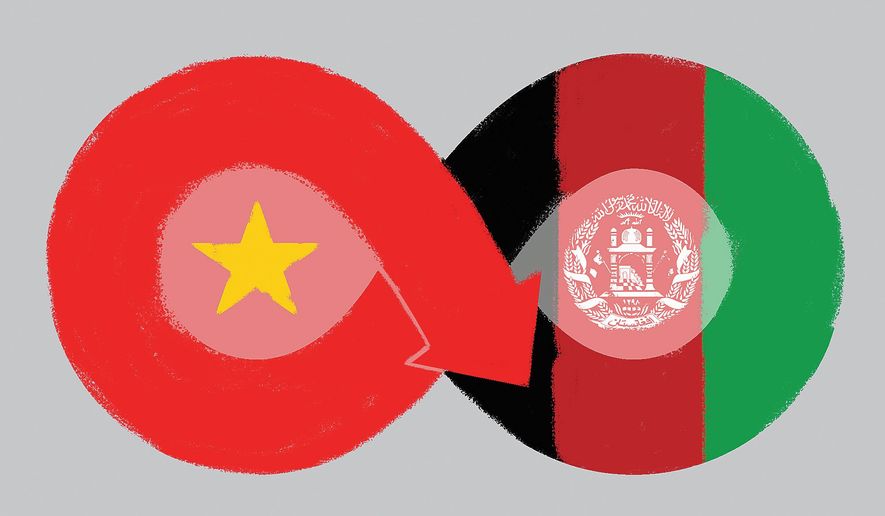OPINION:
We haven’t heard much about Afghanistan in the news lately. Occasionally, an American will be killed, or there will be a bombing, but the current U.S. strategy of the “Afghanization” seems to have produced a stalemate that is not necessarily a bad thing.
The United States is providing air support, but is also trying to improve the capabilities of the Afghan Air Force. U.S. Special Forces and other advisory missions continue to attempt to improve the Afghan security forces. Afghanistan looks today like what the legendary American counterinsurgency expert Edward Lansdale hoped South Vietnam would look like by 1970 had his ideas for counterinsurgency and nation-building had been adopted.
As author-historian Max Boot points out in his new biography of Mr. Lansdale, the U.S. administration under President Lyndon Johnson chose another road when it opted to have American forces lead the fight in 1965. Mr. Lansdale believed that an admittedly imperfect democratic government would break the stalemate in the long run, proving to be superior to what the communists in the north were peddling.
Mr. Lansdale argued that the heavy American involvement in the ground war in Vietnam was unnecessary and that the 1963 coup that toppled President Diem led to a series of autocratic and undemocratic military juntas that undermined South Vietnam’s credibility with the American people.
Unlike the North Korean invasion of the South in 1950, the participation of North Vietnamese troops in the South in 1963 was significant but potentially containable had America limited its support to air power, naval gunfire and advisers. Mr. Lansdale and like-minded advisers had hoped to help the southern regime in Saigon reform sufficiently to show what capitalism and a free market economy could do.
Mr. Lansdale had hoped to eliminate the poisonous brother of South Vietnam’s leader by luring him to America with the promise of a sinecure at a U.S. university so that Mr. Lansdale and other American advisers could steer the nation toward a capitalist if imperfect democracy. The 1963 American supported coup quashed all that.
The situation in Afghanistan today is similar to that of Vietnam in 1963. The Viet Cong and their North Vietnamese masters controlled large swaths of the countryside, but the populations of the cities and urban areas did not want communism. As with the government in Saigon in ’63, today’s Afghan urban population is largely ambivalent toward a government that is largely viewed is corrupt and ineffectual, but most urban dwellers understand from hard experience that the Taliban would be bad for business, and ISIS or al Qaeda would be worse.
As in Vietnam, the rural village dwellers that I worked with in Afghanistan in 2011-12 generally just want to be left alone. Most are self-sufficient and no one but the most incompetent farmers are starving. Many view Western innovations, and even education, to be unnecessary. As one farmer told me as I was trying to get his son to go to school; “when I am gone, he’ll inherit my sheep and melon fields, what good will school do him?”
Mr. Lansdale believed that, absent outside influences and given land reform for peasants to own their farms, the Vietnamese peasants in the south would prefer capitalism and that free elections in communist-dominated areas of the south would drive out the communists more effectively than American military effectiveness. We’ll never know if he was right.
After a decade of U.S.-led war in Vietnam, the Americans withdrew all aid and air/sea support. In 1975, South Vietnam did not fall to an insurgent uprising; it collapsed under a brutal North Vietnamese tank assault supported by Soviet and Red Chinese supplied artillery. The South Vietnamese had resisted such an attack in 1972 with American help, but absent continued training and material support, the South Vietnamese military could not stand up to a conventional military assault.
The Taliban do not have tanks and heavy artillery. Unlike Vietnam of 1975, the Afghan army and security forces still have American advisory, logistics and fire support. The goal is to make them increasingly self-sufficient absent massive American involvement on the ground while trying to help the Kabul government become more effective.
None of this will happen overnight. Given free elections, some conservative provinces and districts may well opt to live under Taliban-style Sharia law, but that would be their decision. At least they would have the choice that South Vietnamese never got. Wherever Edward Lansdale is, he’s probably rooting for the current strategy.
• Gary Anderson is a retired Marine Corps colonel who has been a civilian adviser in Iraq and Afghanistan.




Please read our comment policy before commenting.